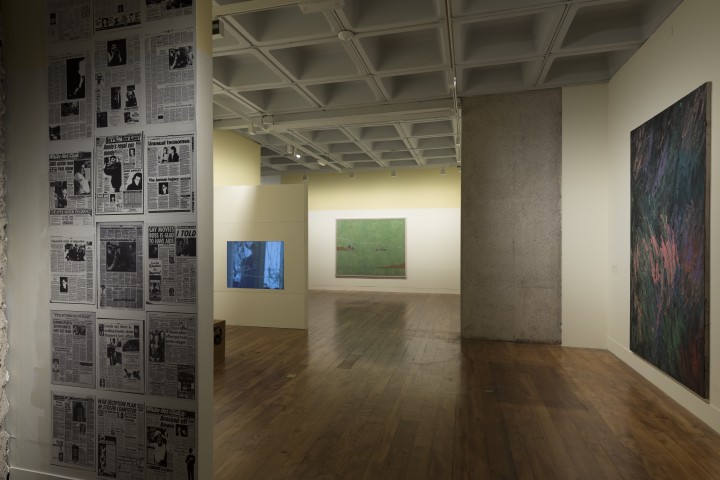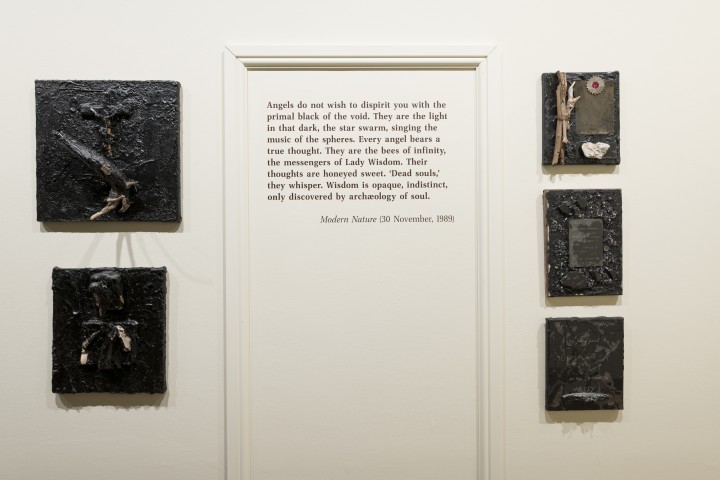Scottish Art News
Latest news
Magazine
News & Press
Publications
Digging in Another Time
By Neil Cooper, 29.11.2024

When a live staging of Derek Jarman’s final film was presented at Tramway in Glasgow last month, it heralded a major new exhibition of Jarman’s work opening at the Hunterian Art Gallery. The film, 'Blue Now,' saw four performers read Jarman’s text for 'Blue' (1993). Extracts from Jarman’s diaries, as he came to terms with losing his sight from an AIDS related illness, were heard over an Yves Klein hued blue screen as the film’s sole hypnotic visual.
Digging in Another Time: Derek Jarman’s Modern Nature is the first Jarman exhibition in Scotland since 1992. Despite the thirty-two year gap, it marks a continuation of the late filmmaker’s connection with Scotland dating back decades. While this comes largely through a headline making 1989 show in Glasgow as part of the National Review of Live Art (NRLA), other tangential connections left their mark, with Jarman going on to influence a new generation of artists shown alongside him at the Hunterian.
 Derek Jarman, 'Positive', (1992). Courtesy of Keith Collins Will Trust and Amanda Wilkinson, London
Derek Jarman, 'Positive', (1992). Courtesy of Keith Collins Will Trust and Amanda Wilkinson, London
Digging in Another Time features works from across Jarman’s career, drawing in particular from the last five years of his life prior to his death in 1994. At the Hunterian, Jarman’s work sit alongside four new commissions by Andrew Black, Luke Fowler and Matthew Arthur Williams, plus work by Tom Walker, Sarah Wood and a performance in 2025 by Jade de Montserrat.
Some of Jarman’s diary entries that inspire the new exhibition refer directly to ‘Installation’, presented at the Third Eye Centre (currently the site of the Centre of Contemporary Arts) in Glasgow as part of NRLA. Jarman’s involvement was instigated by Neil Bartlett, the theatre director behind 'Blue Now'.
The two men met when Bartlett was Mistress of Ceremonies at NRLA, and invited Jarman to contribute. The result saw two men sitting on a bed surrounded by newspaper cuttings featuring some of the shock-horror tabloid headlines that had damned AIDS as a ‘gay plague’, while the then UK government had introduced Section 28, a clause in the 1988 Local Government act that stated that local authorities ‘shall not intentionally promote homosexuality’. In Jarman’s installation, the couple were ringed by a circle of barbed wire.
The explicit symbolism of Jarman’s work fed into his 1990 feature, 'The Garden'. Despite the mix of polemic and poetry of both, this didn’t stop someone at the Third Eye wanting to call the police to complain that their family had been exposed to gay propaganda.
A talk Jarman gave at the Third Eye during NRLA was a key moment during the run of ‘Installation’ and is used by Walker in his film, ‘You’re saying exactly how I feel’, which forms part of Digging in Another Time. For the Hunterian’s Curator of Contemporary Art, Dominic Paterson, Digging in Another Time has brought a key figure of 1970s and 1980s gay culture back into the frame.
“I found that moment of Jarman at the Third Eye incredibly fascinating,” says Paterson. “ When you read Jarman’s journal, you realise how important it was to him to receive this invitation to make a show that would be in some way live, and you realise how this central motif of two men in a bed bleeds into other things Jarman was doing. That’s impressed me for a long time, He was HIV positive at the time, and his frankness and openness about that and about his sexuality at that time in 1980s Britain was so rare from public figures. So when I started at the Hunterian in 2017 it was pretty much the first thing I suggested we do.”
By the time of his Third Eye Centre show, Jarman’s films had appeared at Edinburgh International Film Festival. Several of these featured actress Tilda Swinton at a time when she was also making waves on stage at Edinburgh’s Traverse Theatre, most notably in German writer Manfred Karge’s play, 'Man to Man'. Swinton played a woman who after the Second World War disguises herself as her dead husband.
With Swinton one of the original voices in 'Blue', the film’s soundtrack by Simon Fisher turner was augmented by tracks from several fellow travellers. This included ‘Lesbian Man’ by Nick Currie, the Edinburgh born singer and writer known as Momus. Hearing Currie’s lyrics for his song, ‘Lesbian Man’ read rather than sung in 'Blue Now' was a hoot.
Another key figure in Jarman’s work was James Mackay, the Inverness born producer who oversaw all of Jarman’s films from 1981 onwards. 1989 also saw Jarman’s work presented at several Scottish venues, including the Lyth Arts Centre in Caithness, and the Richard Demarco Gallery in Edinburgh
Jarman returned to Glasgow in 1992 for At Your Own Risk, a major exhibition at Kelvinrove Art Gallery and Museum. The same year he provided design for an Edinburgh production of Jean Genet’s play, 'The Maids', directed by Christopher Payton.
Jarman’s fearless expression of gay culture and angry assaults on homophobia at the Third Eye, Kelvingrove and elsewhere were vital barometers of the fear and loathing of their time. The performance of 'Blue Now' in Glasgow was an equally crucial glimpse at a moment in history when, for Jarman and many others, the personal really was political.
“Jarman has lovely things to say about Glasgow in the journal,” Paterson points out. “He says Glasgow is a city that could feel like home. He loves the sunlight on the old buildings, and how they’ve not been torn down too much. It gets a bit more complicated, because he perceives that people don’t all love what he's doing in the show, and how there are negative reactions.
.jpg) Derek Jarman Et in Arcadia Ego (Aids Memoir Prospect Cottage). (1992). Oil on canvas with black metal foil. Courtesy of Keith Collins Will Trust and Amanda Wilkinson, London
Derek Jarman Et in Arcadia Ego (Aids Memoir Prospect Cottage). (1992). Oil on canvas with black metal foil. Courtesy of Keith Collins Will Trust and Amanda Wilkinson, London
“What Jarman was doing wasn’t the house style in Glasgow at that time. His work was part of a moment of carving out a space for queer love, and for the AIDS crisis to be represented. He’s really connecting with the idea of art as powerful and political in that moment, and making something that is connected to a film, connected to writing, connected to painting, but also completely its own thing.”
Digging in Another Time: Derek Jarman’s Modern Nature, Hunterian Art Gallery, Glasgow until 4th May 2025.




